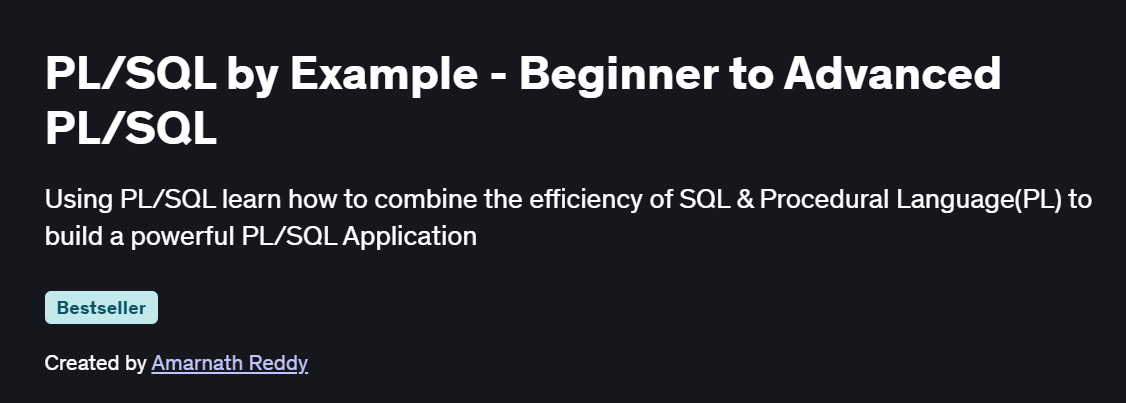What you will learn in PL/SQL by Example – Beginner to Advanced PL/SQL Course
Gain a solid understanding of PL/SQL, Oracle’s procedural extension to SQL, enabling you to write efficient and reusable code.
Learn to create and manage stored procedures, functions, and triggers to automate database tasks.
Understand how to handle exceptions and errors in PL/SQL to ensure robust and reliable applications.
- Explore advanced topics like cursors, collections, and dynamic SQL to handle complex data operations.
- Develop skills to optimize PL/SQL code for better performance and scalability.
Program Overview
Introduction to PL/SQL
⏳ 2 hours
- Overview of PL/SQL and its advantages over SQL.
- Setting up the development environment.
- Basic syntax and structure of PL/SQL blocks.
Variables and Data Types
⏳ 1.5 hours
Declaring and initializing variables.
Understanding different data types in PL/SQL.
Working with constants and literals.
Control Structures
⏳ 2 hours
Using conditional statements (IF, CASE).
Implementing loops (LOOP, FOR, WHILE).
Handling exceptions and errors.
Cursors and Records
⏳ 2.5 hours
Understanding implicit and explicit cursors.
Fetching and processing cursor data.
Using records to handle multiple columns.
Collections and Bulk Processing
⏳ 2 hours
Working with associative arrays, nested tables, and VARRAYs.
Performing bulk operations with FORALL and BULK COLLECT.
Optimizing performance with bulk processing.
Dynamic SQL and Advanced Topics
⏳ 2.5 hours
- Constructing and executing dynamic SQL.
- Using DBMS_SQL for dynamic queries.
- Advanced PL/SQL features and best practices.
Get certificate
Job Outlook
High Demand: Proficiency in PL/SQL is essential for roles such as Oracle Developer, Database Administrator, and Backend Developer.
Career Advancement: Mastery of PL/SQL can lead to opportunities in database design, performance tuning, and enterprise application development.
Salary Potential: Professionals with strong PL/SQL skills often command higher salaries due to their ability to manage and optimize complex database systems.
Freelance Opportunities: PL/SQL expertise is in demand for freelance projects involving database development, optimization, and automation.
Specification: PL/SQL by Example – Beginner to Advanced PL/SQL Course
|
FAQs
- Yes, a basic understanding of SQL helps a lot.
- PL/SQL builds on SQL by adding programming features like loops, conditions, and exceptions.
- If you know how to write basic SQL queries, you’ll grasp PL/SQL faster.
- PL/SQL is widely used in database administration, backend development, and data analysis.
- Roles include Database Developer, Data Engineer, and Oracle PL/SQL Programmer.
- Many finance, telecom, and retail companies rely heavily on PL/SQL for applications.
- PL/SQL is tightly integrated with Oracle databases.
- It allows developers to write procedures, triggers, and packages directly in the database.
- Unlike Python or Java, it’s not general-purpose but specialized for managing large-scale data efficiently.
- Yes, Oracle offers a free version called Oracle Database Express Edition (XE).
- You can also practice using Oracle’s free online environments like Oracle Live SQL.
- Many third-party tools support PL/SQL as well.
- Yes, PL/SQL is still widely used because millions of enterprise systems run on Oracle databases.
- It remains crucial for data-heavy applications, especially in finance, banking, and telecom.
- Modern cloud platforms like Oracle Cloud also support PL/SQL development.





